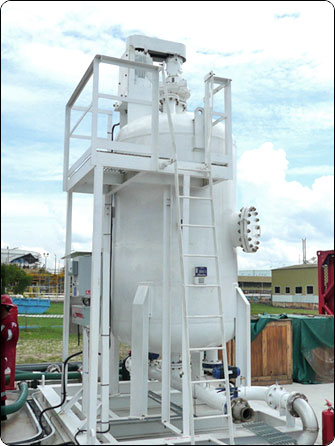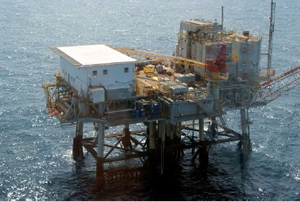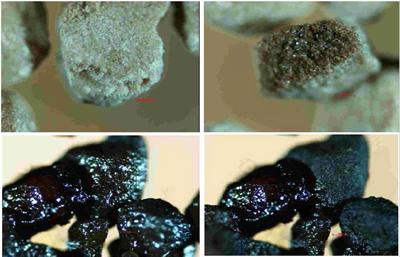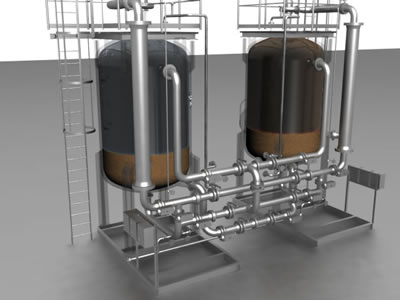Tel: 0086 21 5603 2171
Fax: 0086 21 3325 0914
Email: sales@walnutshellpowder.com
Walnut Shell Filtration System
Why Needs the Walnut Shell Filter?
Clean water is important to the oil and gas industry. As oil fields mature, their water cut steadily increases. After the separation process, the liquid will always contain some residue oil.
Fats, oils and greases content of wastewater can cause many problems in both sewers and waste treatment plants. If oil or grease is not removed before discharge of the waste. It can interfere with the biological life in the surface wasters and create unsightly floating matter and films.
The acute effects of oils on birds, fish and microorganism are reasonably well cataloged. The potentially more harmful is the subtle effect on other aquatic life.
The food industry seeks effective technologies to remove fats, oils and greases. Manufactures of oil containing foods face the problem of reducing the oil containment load to downstream wastewater systems.
A large amount of water is used in the refinery processes and a big fraction of it comes out as waste after getting polluted by oil which enters into the wastewater from leaks, spills etc., at various stages.
Walnut Shell Filter Applications
Walnut shell filters are frequently installed for the removal of oil and suspended solids from produced water, refinery effluent and waste / re-circulation streams found at other industrial applications. Walnut shell filtration system is developed as a more suitable method of filtering free oil and suspended solids in applications where sand filters have traditionally been used. Today, walnut shell filter is used to treat oil field produced water, refinery wastewater, steel mill direct spray and caster water, ethylene plant quench water, copper concentrate decant and cooling water.
In water and waste water applications, walnut shell filters are used to remove suspended solids and insoluble hydrocarbons from oily waste water, groundwater, plant process water, cooling water, water recycling & re-use, produced oilfield water and refinery waste water. In metalworking, power generation, municipal, chemical, and petrochemical applications, walnut shell filter treat and remove suspended solids, oily residues, ash, and metallic hydroxides from industrial liquids. Especially suited for filtering water used for oil field, fooding, refinery disposal and off shore disposal. Also chemical agents are not needed during filtration.
But walnut shell filters are especially valuable in offshore drilling applications, because they are small and light enough to be installed on a ship due to the reduction in backwash water volume and reduction in weight and footprint. The walnut shell filter will play a big role in helping offshore rigs meet new and more stringent water quality regulations. Best of all, a special backwash cycle can safely remove the contaminants from the walnut shell filter media, allowing the walnuts to be used again and again.
Walnut shell is used for the filtration of water as environmentally safe and effective filtration media. Walnut shell is the best technology for the removal of oil and grease, as well as suspend solids from a variety of heavy oil and other oilfield produced water streams. Walnut shell is chemically inert, hard, resilient and perfect for oily water processing. Suggested mesh sizes are 6/10, 12/20, 35/60, 40/60.
Walnut Shell Filter Operating Principle
The walnut shell filter uses a deep bed of 100 percent walnut shells as the filtration media, which have excellent surface characteristics for coalescing and filtration, plus superior resilience to attrition. This deep bed of 100 percent walnut shells offer superior effluent quality, longer filtration runs, and greater throughput efficiency. The walnut shell filter removes about 98% of oil contaminants and suspended solids from a water stream.
The walnut shell filter uses raw process water and gas or air for backwashing, eliminating the need for moving mechanical equipment or external scouring equipment. The walnut shell filter operates at twice the flux rate of conventional sand filters in the same application, and can remove over three times the amount of solids before needing to be cleaned.
Walnut Shell Filter Features
Walnut shells have a natural affinity for oil. The same English Black Walnuts that we routinely crack and eat can be ground up and used to safely and efficiently clean up contaminated water streams.
Walnut shell filters are simple and reliable, compared to many filtration techniques designed to remove oil contaminants and suspended solids from water. There are no chemicals, very few moving parts and the walnut shell filter media can be used over and over again. Walnut shell filters can take water with up to 100 parts per million of contaminants and reduce this level to under 5 parts per million. This is cleaner than normal drinking water.
Couple this with the fact that walnut shell filters can be specifically designed for offshore use to remove more than 98 percent of the contaminants passing through it,
The following is the walnut shell filter advantages:
-Positive media cleanup
-Elimination of compulsory chemicals
-No requiring clean water
-Simple, automatic design
-Up to the minute, state of the art technology
-No air or gas scour required
-Upstream flow is not interrupted
-High flow rates
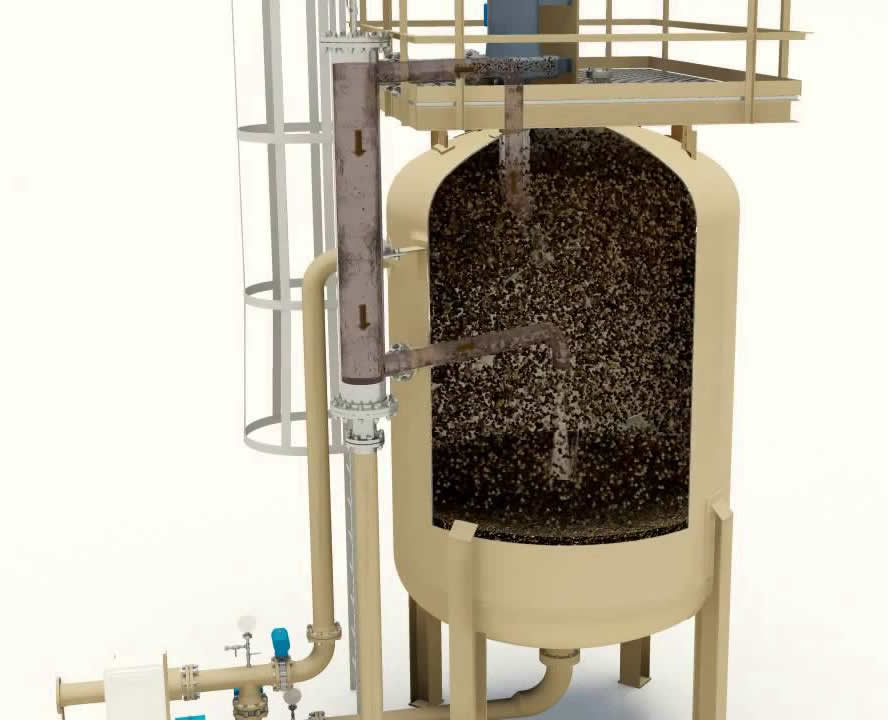
Walnut Shell Filter Operation
During the filtration cycle, dirty process water passes through the walnut shell filter from top to bottom. As the water passes through the walnut shell media, free oil and suspended solids are removed. After 24 hours of filtration, the dirty process water is redirected and pulsed into the bottom of the vessel to fluidize the media bed. In addition, air or process gas is added in a proprietary manner to create an airlift pump.
The airlift pump lifts the contaminated media to the top of the vessel where the turbulence of the backwash water and gas separates oil and suspended solids from the walnut shells. The use of air or gas greatly reduces the amount of backwash water required. The mixture of air or gas and backwash water is separated in an external vessel. One separator vessel can be used for multiple walnut shell filters. Upon completion of the backwash cycle, the flow of dirty process water is again returned to the top of the vessel. It utilizes unfiltered water for media cleanup, eliminating the need for high volumes of clean water.







